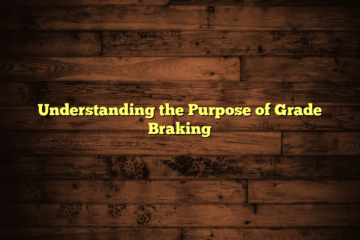Troubleshooting Trailer Brakes: Manual Method Trumps Brake Pedal
Trailer brakes work manually, but not with a brake pedal. This could indicate a problem with the brake controller or wiring.
If you’re experiencing this issue, it’s important to get it fixed immediately for safety reasons. The brake controller is responsible for activating the trailer brakes when you apply the brake pedal in your vehicle. Without it working properly, you may not have enough braking power to stop the trailer, causing a potentially dangerous situation on the road.
In this article, we’ll discuss the possible causes of why your trailer brakes aren’t working with the pedal and what to do to fix it.
The Manual Method To Troubleshooting Trailer Brakes
When it comes to troubleshooting trailer brakes, there’s a way to do it manually. First, you need to understand the manual method. The manual method involves using a lever to control the brakes on each wheel. To troubleshoot using this method, start by doing a visual inspection.
Then, check the brake settings to ensure they are correct. Using the lever, you can test each wheel’s brakes and determine which one is causing the issue. With these steps, you can identify the problem and repair it quickly. Remember to check your owner’s manual for specific instructions and safety guidelines.
This way, you can ensure your trailer is braking properly and safely on the road.
Why The Manual Method Is Superior To The Brake Pedal Method
Trailer brakes are essential when it comes to towing heavy loads. Typically, they work by pressing down on the brake pedal, which activates the trailer brakes. However, there are instances when this doesn’t work, and the manual method must be used.
The manual method involves using a lever to apply the brakes. But which method is superior? When comparing the two, both have advantages and disadvantages. The brake pedal method is convenient, but it’s not always accurate. On the other hand, the manual method requires more effort, but it’s more reliable.
Ultimately, the manual method is more effective and accurate. It can be precisely controlled, so you don’t have to worry about undershooting or overshooting your stopping point. Overall, the manual method is the better choice for safety and accuracy.
Common Issues With Trailer Brakes
Trailer brakes can present several issues, one of which happens when they work manually and not with the brake pedal. This may indicate a problem with the hydraulic actuator or a brake controller setting. Other common faults with trailer brakes include poor grounding, corroded connections, and worn or damaged brake shoes.
Proper maintenance is important to prevent these problems and ensure the effectiveness of the brakes. Among the maintenance practices to consider are periodic inspections, brake adjustments, and cleaning of the electric connections. Therefore, it is essential to have trailer brakes checked by proficiency before hitting the road, and not ignore signs of malfunction.
Proper functioning trailer brakes are crucial for safe and smooth driving, and can help prevent accidents on the road.
Regular Maintenance Of Trailer Brakes
Regular maintenance of trailer brakes is vital to ensure that they remain highly functional. Neglecting to look after your trailer brakes could lead to frustrating and dangerous issues like brakes that work manually but not with the pedal. When it comes to trailer brake maintenance, there are few simple, yet essential steps that you should perform.
Firstly, ensure that the brake pads are never allowed to wear too thin. Additionally, it’s vital that you monitor the brake fluid reservoir to avoid fluid leaks. Always inspect the brake drums for any signs of discoloration, warping, or cracks.
Keep in mind that different types of brakes require unique maintenance techniques, so perform adequate research to identify any specific requirements you may need to follow. By following basic maintenance tips like these, you can keep your trailer brakes functioning well and avoid unexpected frustrations.
Frequently Asked Questions For Trailer Brakes Work Manually But Not With Brake Pedal
Why Are Trailer Brakes Not Working With The Brake Pedal?
It could be due to worn-out brake pads, contaminated brake fluid, or malfunctioning brake calipers. Low brake fluid levels or air bubbles in the brake lines may also cause weak braking performance. Electrical or mechanical faults in the brake system could be contributing factors as well.
What Should I Do If My Trailer Brakes Won’T Engage?
Check the brake controller settings and the trailer brakes wiring. Ensure the brake controller is properly wired and calibrated to the trailer. Test the brake controller output voltages and make sure the brake pads, rotors, or drums are not worn out or damaged.
How Do I Troubleshoot Weak Trailer Brakes?
Perform a visual inspection on the brake system, including the brake pads, calipers, rotors, drums, lines, and fluid levels. Check the brake controller output voltage, adjust the gain, and test the brakes by manually activating the trailer’s emergency breakaway system.
Can Rain Affect Trailer Brake Performance?
Yes, rain and waterlogged roads can compromise braking performance, especially if the brake components are worn out or the brake fluid is contaminated with water. Wet brakes take longer to stop and can cause brake fade, loss of traction, and reduced maneuverability.
Do I Need A Special Brake Controller For My Trailer?
Yes, the brake controller must match the trailer’s brake system requirements and weight capacity. Electronic brake controllers are the most common and are compatible with most trailers. However, hydraulic surge brake systems require a surge brake controller or actuator to activate the trailer brakes.
Conclusion
After going through the possible reasons why your trailer brakes work manually but not with the brake pedal, it is clear that this issue is not one to take lightly. The safety of yourself and other motorists on the road is paramount, and the importance of well-functioning trailer brakes cannot be overstated.
It’s important to properly diagnose the root cause of the issue and take corrective measures before hitting the road. Ignoring the problem may lead to disastrous consequences and impose a great safety risk. Familiarizing yourself with brake systems, conducting regular checks, and seeking professional help when necessary can save you time, money and protect lives.
Remember to always prioritize your safety and the safety of others while driving. Taking early preventative measures is always better than reacting to an emergency situation. Stay safe, stay alert, and keep your trailer brakes in top condition for a worry-free journey.





1 Comment
Who Makes Nissan Brake Pads? Manufacturer Behind Nissan Brake Pads – Automotive Simple · 13 February 2024 at 19:15
[…] more than just parts; they’re the heart of your vehicle’s braking system. When you press the brake pedal, hydraulic fluid is pushed into the caliper, pressing the brake pad against the rotor, which in […]